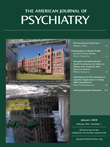Efficacy of Sibutramine for the Treatment of Binge Eating Disorder: A Randomized Multicenter Placebo-Controlled Double-Blind Study
Abstract
Objective: Preliminary evidence suggests that the antiobesity agent sibutramine is effective in the treatment of binge eating disorder, impacting both binge eating and weight. This study is the first large-scale, multisite, placebo-controlled trial to test the efficacy of sibutramine in binge eating disorder. Method: Participants (N=304) who met DSM-IV criteria for binge eating disorder were randomly assigned to 24 weeks of double-blind sibutramine (15 mg) or placebo treatment. The outcome measures included the frequency of eating binges (primary outcome), binge day frequency, body mass index, body weight, global improvement, response categories, associated eating pathology, and quality of life. The primary analysis for continuous measures was the difference between groups in the change from baseline to endpoint using analysis of variance (ANOVA) with the last observation carried forward. Results: Compared with subjects receiving placebo, participants who received sibutramine had a significantly greater reduction in weekly binge frequency (sibutramine group mean=2.7 [SD=1.7], placebo group mean=2.0 [SD=2.3]); weight loss (sibutramine group mean=4.3 kg [SD=4.8], placebo group mean=0.8 kg [SD=3.5]); reduction in frequency of binge days; reduction in body mass index; global improvement; level of response, including the percentage of abstinence from binge eating (sibutramine group: 58.7%; placebo group: 42.8%); and reduction in eating pathology (cognitive restraint, disinhibition, and hunger). The change in quality of life scores was not significant. Sibutramine was associated with significantly higher incidence of headache, dry mouth, constipation, insomnia, and dizziness. Conclusions: This trial demonstrated the efficacy of sibutramine in reducing binge eating, weight, and associated psychopathology.



